Last Friday, a reader alerted us on Twitter that Netflix’s new show One Day at a Time had name-dropped Autostraddle. After collectively jumping around screaming because ohmygod we’re a cultural reference on TV, we were off to the races to find out what gayness lay ahead in this multi-cam family sitcom. There turned out to be quite a lot of gayness, actually. So much gayness it warmed my gay Latina heart — I ugly cried by the end of it.
One Day at a Time is a remake of Norman Lear’s 1975 hit show of the same name that followed the lives of a newly divorced single mom and her two teenage daughters. The updated version pays tribute to the original show in some ways — like keeping the landlord around with his original name, Schneider (although in the update, Schneider isn’t just the landlord, he also owns the building) — but adds a refreshing twist: it’s not about white people!
The new One Day at a Time is the story of a Latinx family, specifically a Cuban-American family, living in an apartment in Los Angeles’ Echo Park neighborhood. Justina Machado plays Penelope Alvarez, an Army veteran and nurse, who is recently separated from her husband. Her mother, Lydia, played by the legendary Rita Moreno, moves in to help raise Penelope’s 14-year-old daughter Elena (Isabella Gomez) and 12-year-old son, Alex (Marcel Ruiz). Each episode revolves around various issues like immigration, sexism, and being a veteran, all served with a dose of Cuban repartee and side of laugh-track.
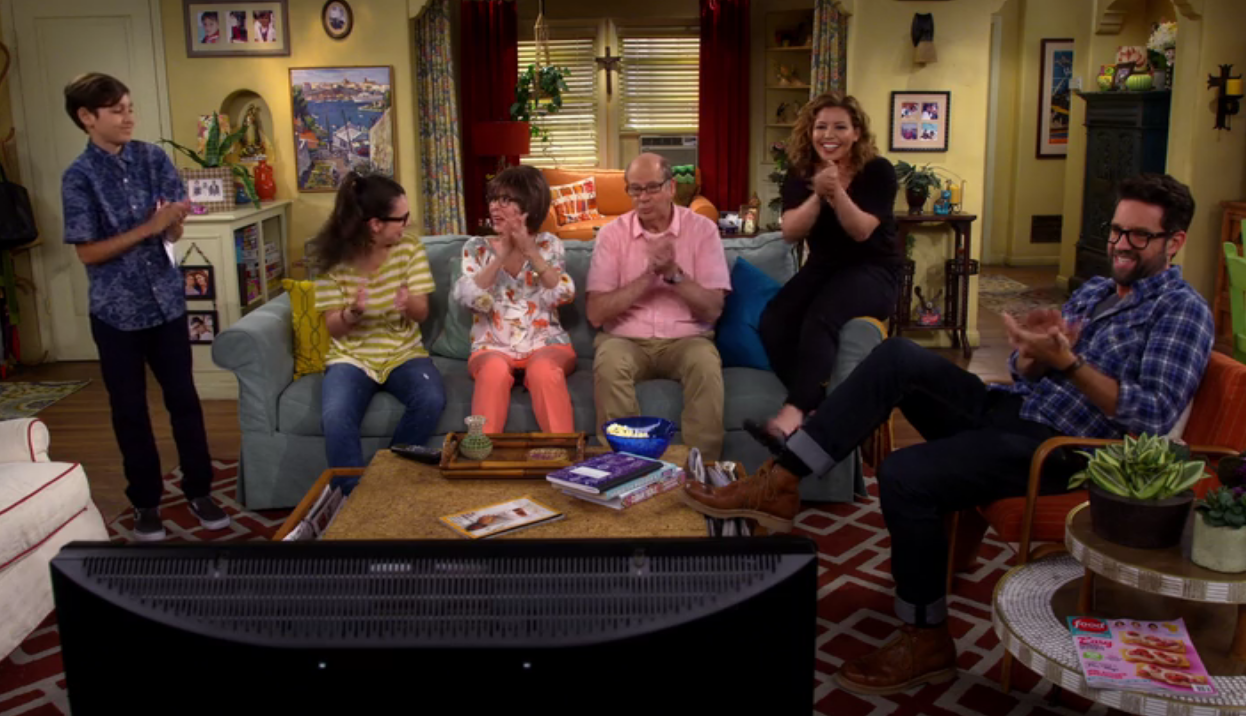
Family sitcoms like these usually end up feeling nauseatingly cheesy, tired, and honestly quite boring, but One Day at a Time is so much fun and endearing and feels so fresh and satisfying to watch because this show gets it. It gets what it means to be Cuban and Latinx, to be a woman, to be gay, to be Catholic, to be a single mom, to be an immigrant, to be a veteran and to be The Diversity. It feels real and that’s what makes this show such a gem.
One Day at a Time proves something we’ve been saying for years: The shows that resonate, that feel authentic, that get inside our hearts and minds and work that magic only stories can do, are shows that hire writers who share identities with the characters they’re bringing to life.
So many badass Latinas were involved in writing the stories of this predominantly Latina family! After Sony Pictures Television, who owns the original series, green-lit the project, writer-producer Mike Royce was tapped to work with Norman Lear on the program. But it seemed risky to put two white dudes in charge of this story, so they sought out writer-producer Gloria Calderon Kellett, whose Cuban-American upbringing in Portland became the basis for One Day at A Time‘s family’s story. Kellet and Royce, as co-showrunners, created a diverse team of 12 writers — half women, two queers, and an overall diverse mix of background: Puerto Rican, Mexican, Salvadoran, Jewish, Irish and English.
https://twitter.com/MikeRoyce/status/817247946316005376
Within the very first five minutes of the show, Elena’s dishing out some feminist-as-fuck commentary, refusing the quinceañera her Mom and abuelita have been looking forward to on account of what she perceives to be the celebration’s inherent misogyny. She eventually changes her mind, but that’s for a feminist reason, too: she wants to show people what an incredible daughter her single Mom has raised, against so many odds. Elena spars with her family on feminist and liberal issues throughout the season, like when she insists on reducing her carbon footprint by taking public transportation. She’s a big nerd and a captain of the debate team, she wears Dr. Martens; she loves Buffy; she’s best friends with a goth bruja named Carmen. She’s a smart, confident, feminist teen — and oh yeah, she’s gay. The cultural references — yes, including our own — are so on-point it’s shocking, like suddenly realizing how sadly we’ve grown accustomed to the opposite.

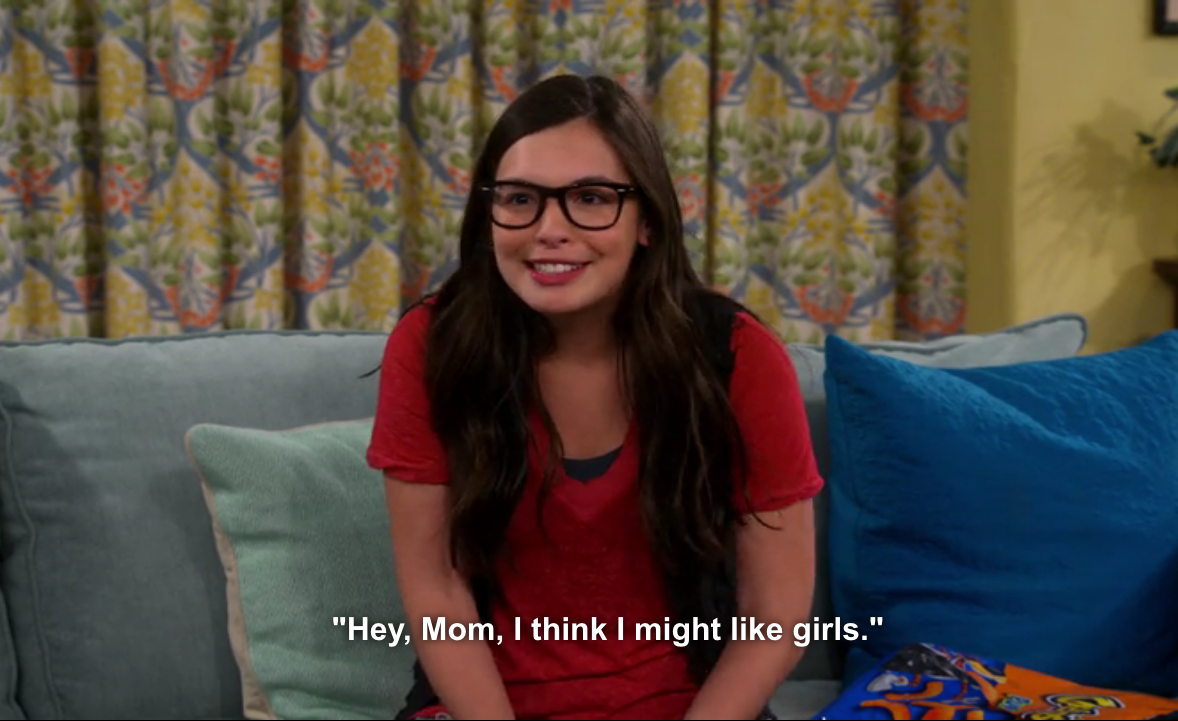
Elena’s coming out process goes beyond the one-episode coming out story most shows grant us; it’s a primary story arc of the entire season, beginning most clearly in Episode Five when we meet Carmen, sharing a snuggie with Elena on the couch that the two are unable to extricate themselves from for pretty much the entire episode. Lydia is suspicious of the friendship, speculating to Penelope, “Pero still, that friendship, is a little bit, eh, como se dice? Intense,” Lydia tells Penelope. “They’re teenage girls,” Penelope retorts. Lydia counters, “Yeah, but no, no, no. I think there’s something a little bit, uh, queer.” Abuela’s gaydar is on point, man.
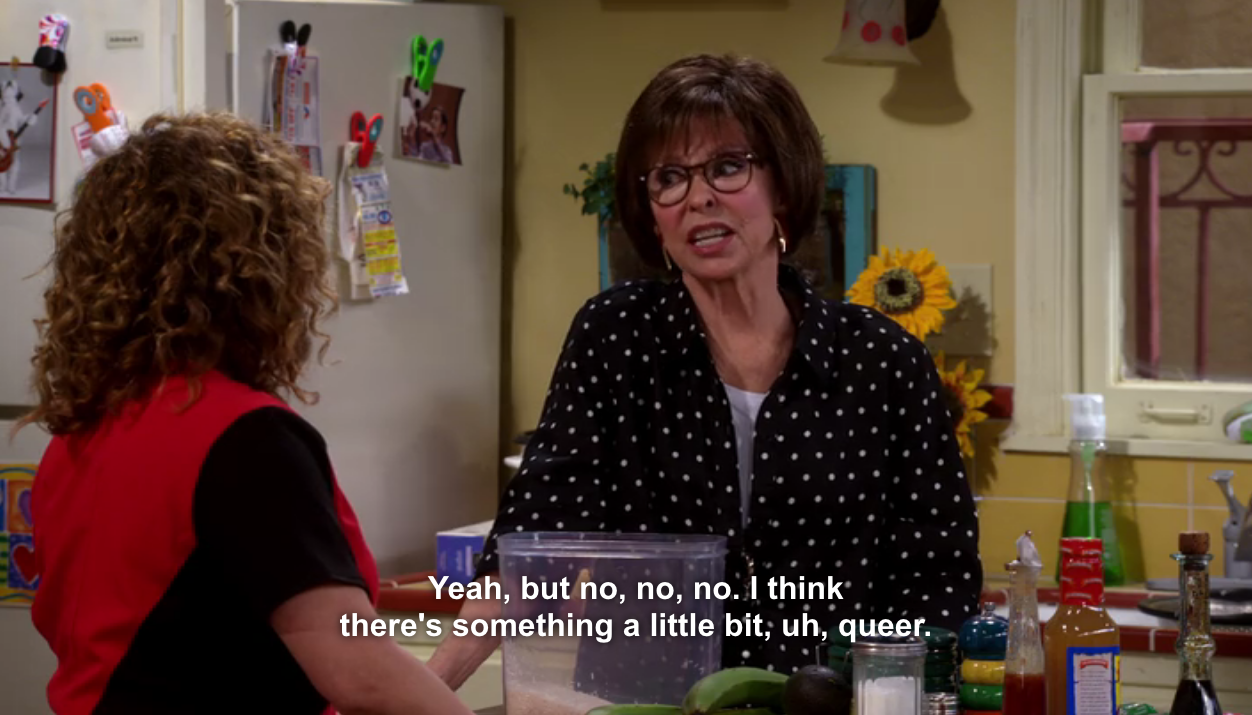
We eventually learn that although the intense friendship was indeed a little queer, the reason Carmen sleeps over every night is more complicated: she’s undocumented and her parents have been deported. The episode that confronts this situation is one of the season’s best. It mixes wry humor with politics yanking tears right out of your face, and getting a well-meaning white Canadian man who had a pretty easy time sorting out his immigration status to confront his own privilege in real time without distracting from the story’s true protagonists.
Later in the season, Elena is conflicted when she’s told she must pick a boy as her quinceañera escort, as the tradition goes. Thinking she’s alone in the house, Elena monologues to herself about not wanting a boy as her escort because she might not even like boys. But Alex, her younger brother, is behind the curtain (Lydia’s room is located behind a curtain in the living room, which proves an excellent comedic device) and hears everything. What ensues is a very sweet moment where Alex is totally cool with Elena’s queerness. “I promise. I won’t say anything,” Alex says. “Anyways, it doesn’t matter. It’s not like you’d be in trouble. I mean, who cares, right?”
Later, Elena confides in Alex about the popular, handsome guy who surprisingly agrees to be her escort, confessing that he’s always had a crush on her. Should she give boys a try? This turn of events could make you grimace, but Michelle Badillo, who is queer and the youngest writer on the show, wrote that storyline because it happened to her. Badillo spoke with Broadly about writing her own coming out experiences in Elena’s character. She hoped to “shape her character as honestly as possible,” even if it meant using a lesbian trope.
“What gave me the most anxiety is that, at first, Isabella [Gomez]’s character Elena dates a boy and is pretty sexually aggressive with him. But there’s a prevalent and understandable complaint in the lesbian community that every time we see a lesbian character, it has to be in the context of a man. On screen, a lesbian always has to make out with a man to realize she’s gay, but that was my real experience. I kind of knew I was gay, but I was so desperate not to be gay, that I was very aggressive with men and wanted to have physical experiences with them just to feel normal. I knew I was contributing to the writing of a trope I know lesbians hate, but that trope was my life.”
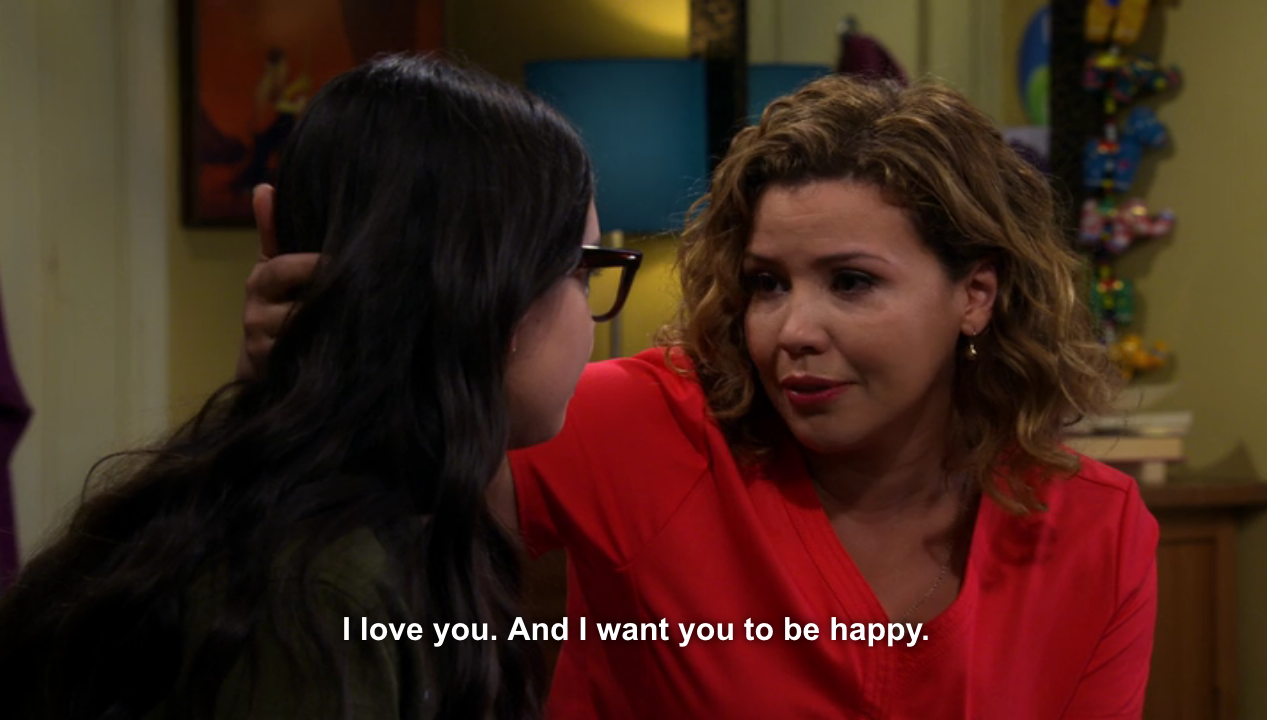
When Elena finally comes out to her mom, she’s honest and says she doesn’t like her quinceañera escort “in that way” — in fact, she has more feelings for a picture of Kristen Stewart than she does for him. She tells Penelope she can only see herself loving a woman, and in the most perfect coming out scene, an emotional Penelope reassures Elena that it’s okay, she loves her daughter and just wants her to be happy. It’s not that simple, of course: later on, we learn that Penelope was putting on a front. She wants to be supportive of Elena, but feels weird about it, and had ideas about Elena’s future she’s scared to let go of. It’s realistic and handled gracefully. Parents aren’t perfect and aren’t necessarily 100 percent on board in the beginning, but Penelope is obviously trying her very best to understand because she loves her kid. She reaches out to her own lesbian friend, Ramona (Judy Reyes), who she met at a women veterans therapy group, for support and to quiet her concerns. Ramona’s advice is for Penelope to continue to be communicative, supportive and loving of Elena while dealing with her reservations on her own time.
There’s a bunch of single moms out there just like Penelope trying to work and raise their kids and for Latinas, that often includes involvement from their parents, living under the same roof. I love that One Day at a Time features strong ass women running the household and providing for their family. Justina Machado is awesome in her role as a veteran mom. Machado is funny but makes the hard shit so real which makes for one hell of a performance. Penelope deals with sexism in the workplace head on and confronts her white dude coworker like a boss and then goes home to parent her kids. Penelope struggles with getting the medical attention she needs from the VA. She juggles being a newly single woman in the dating world. Meanwhile, Rita Moreno gives life to the show with her over-the-top personality and had me laughing throughout each episode and had me in tears at a couple of points, one being when she recounted Lydia’s story fleeing from Cuba and ultimately leaving family behind. Lydia is such a diva but also is warm and teaches some powerful lessons to her daughter and grandkids. The women on the show made the show move during its fun, boisterous moments and during its serious, quiet moments.
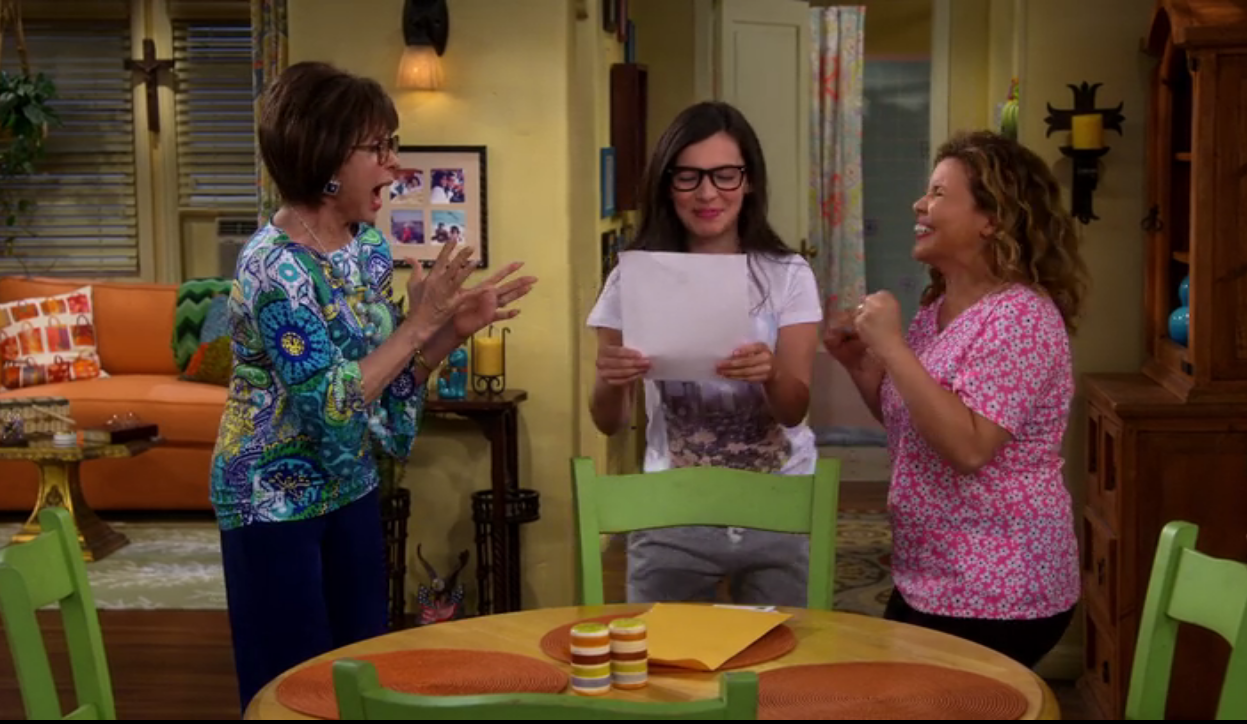
Even though I’m Mexican American, I loved that One Day at a Time centered around a Cuban-American family and was deliberate in its specificity. It’s very easy for media to homogenize Latinxs and lump us all together and erase all our different identities that we get lost in who we really are. We need more media that dives into a specific Latinx culture and tells our rich histories and inside jokes and culture. As a Latina, I learned so much about Cubans from this show, specifically regarding Cuba’s history and how exile affected its people. The Cuban coffees made with Cafe Bustelo and the “¡Azúcar!” and certain insults in Spanish and even the way the family refers to a quinceañera in the plural “quinces” all the time is not part of my culture. But I understood every last bit of it and felt at home with them because my family is just like them.
At the same time, I shared so many common experiences with the characters. Besides the gay story arc, the other issue that really resonated with me was when Penelope was so hesitant to tell her mom she was taking anti-depressants and going to therapy. I’ve never seen Latinxs on TV tackle a subject like it. Just as Lydia demonstrated, in Latinx families talking about depression or anxiety is taboo, let alone trying to get help. You just don’t talk about your mental health problems because it means you’re weak because you can’t handle your shit or it means you’re just being stupid and your problems aren’t real and you just need to toughen up. I was so scared and nervous to tell my mom that I was going to therapy that I had to talk about it in therapy! Watching it being talked about on TV made me feel not so isolated. I was so happy One Day at a Time can show other Latinxs that mental health is important and just as routine as going to the doctor’s office.
My all time favorite part of the show was the last episode which leads up to Elena’s quinceanera. Throughout the episode, Lydia keeps tailoring Elena’s fancy dress for her big day. Even though Elena says she loves it, Lydia doesn’t believe she’s in love with her dress. Elena admits that she doesn’t feel totally comfortable in it like she does when she wears ties, fedoras and jackets. Apparently, Lydia finally gets the final wardrobe adjustment right because when Elena sees it she’s in tears and even though I didn’t see what she’s gonna wear, I’m in tears too. When Elena walks out for her big reveal, she’s wearing a glitzy, fabulous femme white suit. I busted out crying again, my friends, because her abuela made her a gay little suit. It’s more than just Elena stepping out in this beautiful suit, it symbolizes Elena’s coming out in more ways than one — as a young lady who is comfortable with who she is and with a family who’s by her side no matter what.
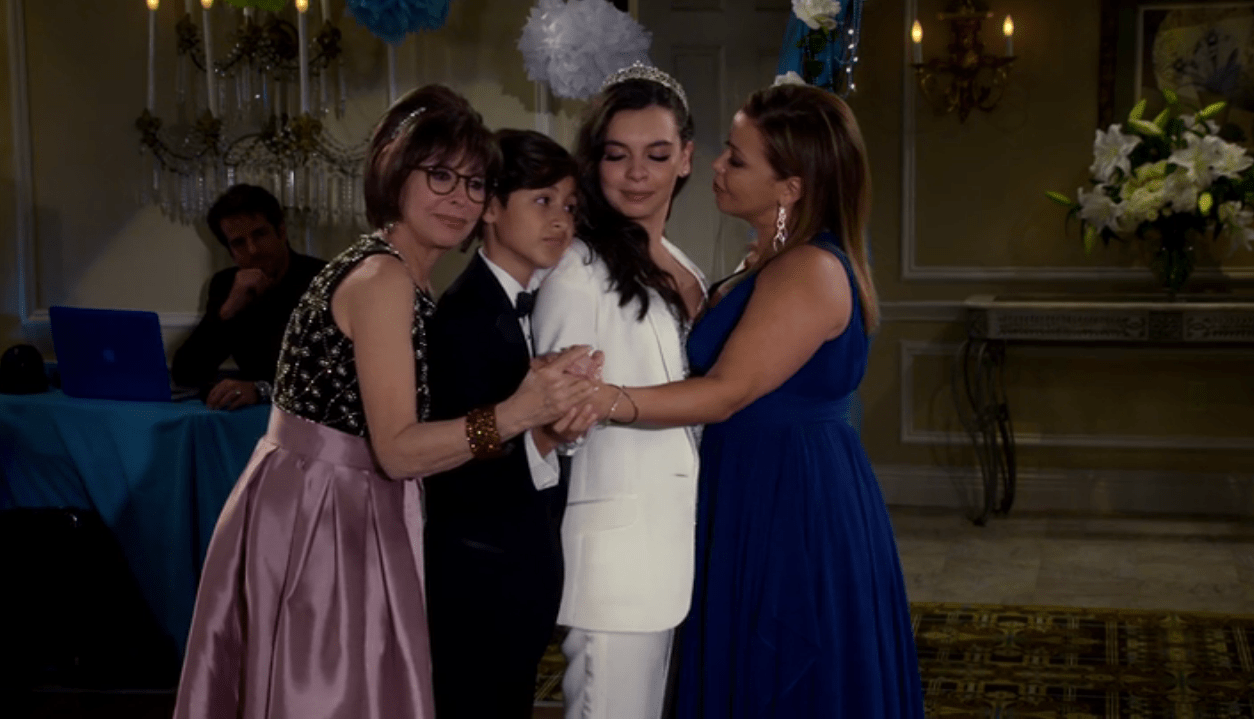
You might say multi-camera comedies are a thing of the past. After all, the last multi-camera comedy to win an Emmy was Everybody Loves Raymond in 2003 and 2005. Single-camera comedies without laugh tracks are the norm now, and that’s especially true if you’re talking about comedies that center on any group of people who aren’t straight white men. Veep, 30 Rock, Black-ish, Modern Family, The Mindy Project, Fresh Off the Boat. You know, the kind of comedies that give Trump voters heart attacks. But back in the ’70s and ’80s, sitcoms like One Day at a Time managed to confront important social issues within the family unit. Norman Lear’s shows, specifically (All In The Family and Good Times) were at the center of this trend.
As the multi-cam format has fallen out of favor with young viewers and coastal elite liberals (where most TV criticism gets written), the format has aimed its arrow directly at middle America, bringing us (more) tales of ordinary white families, centered on the middle-aged mundane dad and his straight man shenanigans. Even newer multi-cam sitcoms that have been recently nominated for Emmys — Two and a Half Men and Big Bang Theory — are about white men.
One Day at a Time is so revolutionary in its depictions of what a family might actually look like in America. It’s got the same recipe of an old school family sitcom but turns the norm on its head because it centers the family’s brownness and provides ample social commentary to deliver a fantastic modern-day sitcom.








Comments
Ahh! I’m so glad you wrote more about this because it was so good. My mom gave me a hug, crying, when she finished the last episode because she was so upset with Victor who couldn’t accept his child. But it was so accurate and true to a lot of people’s experiences. I loved Elena so much, she was such an adorable baby gay and Lydia reconciling her Catholic faith with her gay granddaughter in less than 10 seconds was so hilarious and amazing.
Yvonne I’m getting tears in my eyes just reading about you talking about the moment she opens the gown bag and starts to cry. Like I started ugly crying at that time and the tears did. Not. Stop. Until the end!!!
I adored this show, for how well it handled all the topics, and how much the gay coming out storyline resonated with my own.
I want everyone to watch this show and for it to win all the awards. And like I said in Also.Also.Also, I would LOVE if we could have an interview of Michelle Badillo just so that we can SHOWER HER WITH LOVE AND APPRECIATION in the comments.
For me it was the moment in episode 2 when Elena explains to Lydia how she feels when she wears makeup. I have never heard that so well-articulated in a tv show. Ever.
Please interview Michelle Badillo and throw our other glorious and talented Lesbian, Becky Mann in there, too, please. These women shared their hearts and souls with us to make sure we got it right and deserve your love!
Ughhhh Yvonne this was so wonderful, this show is so wonderful, and you articulated exactly why. I binged the whole thing this weekend, and I’m already excited for a second season.
Thank you so much for writing this, Ever since Heather hinted you were going to drop a full thing on it I’ve been checking the site periodically to read your take.
I need to like share my feelings because there’s so many:
as a Latinx, more specifically a Venezuelxn immigrant I can say this show like lifted me in so many ways.
I cried so much, it’s like a problem.
I haven’t felt so much with something since like Tara died in Buffy and I watched it in 4th grade.
I love this show sooooo much.
I see myself in all 3 of the them, as an immigrant from a country that is falling apart in extremely similar ways Cuba did with the Castro regime the immigration episode and Lydia telling her story had me crying for like 4 hours, I relate so heavily to her experience with my own, and I’ve never had that, I’ve never had that on TV.
Also something I absolutely LOVE about this show is the perspective on different issues (sexism for example) through 3 generations of latinx women. There’s an underlying common theme, but they explore different experiences, and how they approached it, how much they had to compromise then, and how much they have to compromise now. Like Lydia talking about tricking men into thinking they own shit but knowing they don’t, Penelope kinda in the middle saying she didn’t take shit from men hitting on her in the army and then Elena talking about microaggressions and mansplaining.
I thought that was brilliant.
I think this show is brilliant, and I can’t stop talking about it.
I need more of it, I’m like heavily missing it everyday. Now that we have it, I sure as hell hope we don’t lose it.
sorry for going off, too many feels
The moment when the man in the show mansplains mansplaining, though.
Like, he is the butt of the joke! Utter perfection.
Ugh that was SO GOOD. At first I was confused about Schneider, I didn’t understand his purpose, like, why was he THERE!? But then as I kept watching I realized that he is actually so USEFUL as a narration device. He’s the truly good-hearted wealthy straight white man who means well, but just DOES NOT GET IT and he is used in almost every episode as a way for either Elena, Penelope or Lydia to explain something (kind of fundamental) to him. The mansplaining thing, but then also the immigration episode, and the episode where he walks in wearing the Che Guavara shirt!?
Think about it – how often does a straight white guy get to be narrative plot device the other characters explain stuff TO? The West Wing is one of my favourite shows, but there’s this device Sorkin relies on a LOT where either CJ or Donna don’t know something, and one of the guys have to explain it to them, and it is REALLY ANNOYING. I love it SO MUCH that it is the straight white guy playing that role on this show.
Don’t apologize, thank you for sharing all your feels!
Yvonne, this was beautiful and wonderful and I felt so full and happy the whole time I was reading it.
Oh Yvonne! I loved the show and I loved this recap! Even though it had the usual predictable plot twists that go with the multi-cam sitcom territory, they didn’t take away from any of the story’s emotional resonance, and Elena’s storyline was done SO WELL. The scene with her mum at the very end of the final episode made me properly weep!
While I was watching the show I was appreciating it on so many levels. It’s 100% true what you have all been saying about the format being an effective way to tell this story. It’s familiar, it’s perfectly cheesy, and it’s accessible. I love that Penelope initially struggled with Elena being gay whilst still loving her daughter fiercely and fully. I love that Elena tried to like a boy before accepting that she only likes girls. Both of those things were true for me personally, and they’re true for many others. And I love everything else you’ve already covered in this review about how the show deals with race, gender, class, family, therapy and mental illness, etc, etc!
Just writing this I started to cry again because if shows like this had existed 15 years ago, when I was Elena’s age, I would have felt so much less alone. I’m so happy for the kids that get to see themselves in these characters and feel good about being who they are.
Hi so I’m at work and can’t binge or fall over about these episodes. I’m only on episode 4 and everything is amazing and the level of detail including the moody Avril poster in Elena’s room to the interracial gay man date happening in the background and a majority of the background extras being POC at this restaurant and THIS. IS. AMAZING. AHHHHH
I love so much that you noticed those little details. Both were things we did purposefully so I love so much that you noticed!!
I just binge watched the show this weekend and absolutely loved it. I couldn’t believe they dedicated so many episodes to Elena coming out, i kept expecting they would screw it up somehow but it just got better and better. Thank you to the writers for showcasing this queer storyline with so much heart, it was like the dream version of my coming out story that never happened. I also loved how Penelope handled her misogynistic coworker, she said all the things I wanted to say but couldnt when i faced a similar situation. It was SO satisfying to watch. I really hope they get a season 2
“I busted out crying again, my friends, because her abuela made her a gay little suit.”
I TEARED UP READING THIS. I finished last night and I still have so many FEELINGS about this show, and you captured them perfectly THANK YOU
No offense but sometimes your review turns into an entire description of the show from start to finish. Reminds me of when you could leave a description of a show on Netflix. You would get entire descriptions like this. Not bad but not sure if I want to watch it now.
Basically you gave us the cliff notes version of the series.
Well, aren’t all in depth reviews pretty spoilery by nature? I don’t like spoilers either, so If I’m deciding whether to watch something or not, I usually just read the first couple of paragraphs and then skip to the conclusion, and come back to read the bulk of it when I’ve watched it to compare notes and get some insight into it I mightn’t have had myself.
As here! I’m only a few episodes in (thanks to Heather’s article the other day; no way in hell would I have thought to watch a random Netflix sitcom otherwise, but it’s actually awesome and I’m glad I am) so I’ve only skimmed this for now, but I’m excited come back when I’ve finished it to read Yvonne’s thoughts on it, cuz Yvonne’s thoughts are always worth reading.
I watched it in a day and a half! I haven’t enjoyed a sitcom like this in so long! The last episode as both really sad and really uplifting. I sure hope it gets another season!
I am absolutely watching this show.
I already make it a personal policy to not read books by/about white/cis/het men, and I think I’m expanding that to include media that is exclusively/predominately white/straight/cis/dudes. Does that mean I can still watch Sherlock because I read Sherlock as asexual? In any case. More diversity for the win!!!
Also I noticed that in this article “Mom” was capitalized but “abuelita” was not and that prompted me to spend an hour googling and reading about capitalization rules in Spanish because I am nerdy like that. So thank you on both points!!
I’ve been planning to watch this anyway, after hearing nothing but raves from people I trust, but I honestly got a little bit teary even just reading this? So I’m going to have to watch it ASAP. Probably with kleenex.
oh man, i watched this after the autostraddle name-dropping article and was like ha ha such a silly sitcom WHY AM I CRYING ha ha so silly. i usually refuse to full-on cry at cheesy heartstrings moments but i sobbed at the dance part of the last episode, and the dog frantically started rolling on her back so i could pet her tummy and feel better.
watch this show with a dog and definitely not with someone you want to impress with your stoic disposition.
‘The dog frantically started rolling on her back so i could pet her tummy and feel better’
Oh my god I need a dog ASAP
There’s a moment where Elena is catologing the features of her quinces escort in order to figure out if he’s attractive. It was such a small thing, but I did that. One of my best friends is a gay man and I STILL do that when he mentions he thinks a guy is attractive (he teases me all the time for how I have to like pause and think through all of the guy-in-question’s features because I have zero instincts).
And having Elena do that just meant so much to me because I’ve never seen that on TV.
I’m white, but I’ve never felt more seen as a queer woman than I do from this show.
Exceptional, funny, beautiful, real.
The show, not the article, although the article was outstanding too, really helped me to understand why and how this show was so good.
Soooo, I have been avoiding this article and all others about “One Day At A Time” because I’m watching the show with my 60 year old Latina mother (who raised me as a single mom)… which was absolutely the right decision for me and us personally, but when you commit to a streaming schedule with a woman in her 60s and who has a full life… well, let’s just say she isn’t down with “binging” as a concept.
We are moving slowly. We are loving it. We are crying and laughing and happy. But, I am admittedly avoiding [SPOILERS].
Which is a REALLY, REALLY long intro to say: I’m sorry I couldn’t read this article Yvonne, but I am sure it is brilliant and I am really happy that it exists!!!!!
:)
Watched this just for the autostraddle reference. Stayed for the high quality show. Thanks!
Love it, love it, love it. My wife and I are currently on episode 5, so I haven’t read all of this article, yet, but so far it’s amazing and I love it. My wife and I love this show, and we’ve already laughed and cried a whole bunch. I loved when Lydia put the picture of Serena Williams on the fridge next to the pope. Elena has a picture of Elizabeth Warren in her room!
Thanks for writing this!
I love this show so much! I really really hope it gets more seasons! I’m already rewatching it cause I just want to stay in their world a little longer.
I absolutely love this show!
I’ve already finished watching the entire series, and I’ll likely start watching it over again soon. I don’t have words for how amazing this show is – how heartfelt, how much it resonated with me, and how I didn’t know what I was missing without it.
Beautiful, Yvonne. I can’t wait to watch it.
I love this show!!! This is my family!!! Like from the younger brother that cares more about his looks and shoes/clothes more thatn I do, to not wanting to have a quinceañera party but doing it fro my grandmothers to the kick ass latin mom.
Seriously this sitcom is literally my life.
To give you guys an example, all my teenage years i had long, below the waist, hair. My grandmother’s dream was for me to have my hair like that since I was a kid because her Telenovela hero Daniela Romo had it like that. When I was like 19 I decided to cut my hair and it was a family crisis, like every single member of my family had an opinion about it. Finally I did cut it RIGHT BELOW THE SHOULDERS, and my grandmother and mom almost stopped talking to me.
To sum up how dramatic a latina mom can be, her first words to me after i cut my hair were “you just cut away your beauty”!!!!!!
Sure it’s corny and cheesy as hell, but damn it, I found myself crying at times! I related so much WHILE watching just the first episode. I too didn’t want a Quinciañera (but not for Elena’s bad ass reasons) mostly because I was (still am) a bit of a social outcast and having that much attention on me was a huge no-no. Also, did not want to wear a dress! My aunt and I share a birthday, so my mother and I compromised with throwing just a really big birthday party. All of which I stayed locked up in my room avoiding everyone. :D
While my abuelita wasn’t as over the top as Lydia’s character, it made me miss her a lot. I was raised by two women (my mother + grandmother) so this hit a lot of familiar notes.
I hope there’s a season 2!
I was so excited to see this review and the article about the AS name-dropping. This was wonderful timing, since 1) my family just got Netflix for Christmas and 2) I just had a couple of uncomfortable conversations with my parents regarding my sexuality and lack of plans to have kids (even though I came out well over two years ago?!). I’ve only seen the first episode so far, but wow, it was on point! They get it! I am recommending it to them and hoping someone else in the family watches too. Like Yvonne and Nani Albornoz above, I am also not Cuban (I’m Mexican-American/New Mexican), but even though the details are different, I appreciate both having specific cultural references, and the overall family dynamic, which feels close to home nevertheless.
Also, thank you for pointing out the bit about mental health, Yvonne. I hadn’t really realized that might be a cultural thing before or something I may have internalized (without my parents saying much explicitly), but when I read it, I thought, “oh, could that explain…?”
I’m white, and I have no personal knowledge of any of the Cuban or latinx specific references. And yet, I feel like this is one of the most relatable shows I have seen on TV. I was jointly raised by my secular, center-leftist parents, and my ultra conservative Catholic grandmother. The generational differences were so on point. I’m the queer feminist of the family, my other sibling is the one working hard to be fashionable on a budget.
I almost never cry watching television, but the coming out storyline emotionally destroyed me. I’m begging my parents to watch this show hoping that they will see themselves in Penelope and recognize their own discomfort with my queerness that they try very hard to mask. My grandmother passed away without learning that I am queer, but I have always taken it as a given that she would have rejected me if she knew. I’m crying now just thinking about Lydia’s unexpected acceptance of Elena’s queerness.
Also Schneider is a politically brilliant character. This last election revealed white people’s collective insecurity about being left behind in an increasingly diverse world. Schneider’s character shows that POC can be front and center, can run the show, and be the majority, and there will still be a place for even the most stereotypical boring white male to feel included and loved and forgiven for his mishaps, as long as he is well-meaning.
After watching this show, I am convinced that latinx families are the future of sitcoms, and I am so on board with this.
I haven’t watched this yet, but have been planning to since I heard about the Autostraddle namedrop; this has confirmed that I absolutely have to watch it as soon as possible.
Seeing a little baby Cuban lesbian just like me would have changed my entire goddamn life if this came out when I was fifteen. I’m almost worried it’ll be Too Much and I’ll have too many Feelings watching it — I almost cried just reading about her abuela making her a suit, because /damn/, do I wish mine would do that for me — but I guess that’s a risk I have to take.
Representation matters so much.
I actually felt comfortable watching it. Do you know how long that’s been that I didn’t have to sit tensely, and wait for casual sexism or rape culture pretending to be family entertainment? Or be bored out of my skull with characters I couldn’t identify with?
I don’t watch anything anymore without several recommendations from people I trust, just to save me the hassle.
And I’ve never really cried at sitcoms like this! Is this how straight people feel all the time??? Having media that they identify with and that reflects their lived experiences???
Those lucky bastards.
I just finished binging the entire show and it is incredible! 10/10 would recommend.
And Yvonne, your review is wonderful! Thank you for spreading the good word about such a great show
I’ve only watched one episode so far, but I absolutely loved this and will be watching all the remaining available episodes this weekend.
I found this such a sweet and relatable show, and I’m so glad you brought it to my attention.
Thank you for writing the review as well – having your perspective (and those of some of the commenters above) who are Latinx is really helpful and makes me love the show even more.
I didn’t know about this show until I read this! I watched the first episode and I like it so much :) Thank you! Is there any way to send the ‘YES more of this!’ message besides watching it?
Reading this review is making me emotional, and I haven’t event watched the show <3
Currently binge watching this show. I love it!
This show is so great, as a Latinx woman who went to an all girl’s Catholic school coming out is hard and I did not do it as young as Elena. The grandmother reminds me of my Abuelita in so many ways, I never got to tell her outright that I was gay before she passed, but I know she knew. One day she said “In my old age I have become very open minded” and she winked at me. I am glad this show exists!
I tried…. It’s a pretty generic sitcom, ergo, meh with a side of blah.
Dafuq is “Latinx”?
A ridiculous word made up by american latinos that have english as a first language and dont understand how latin/romance languages work.
Just finished this show tonight. Please renew it for a second season.
what a great celebratory article! can’t wait to watch this!
I stopped reading at the part about Elena coming out, because I want to watch it unfold and come back to this. But two episodes in and ohmygah, this show is so good!
I cried so many times through this show– and I’ve tricked my conservative parents into watching it. I’m hoping they get hooked so that they will see Elena’s storyline and we can have space for more dialogue about how it feels to be gay. Yvonne, THANK YOU for the recommendation for this show– it’s very literally changing my life!
Thanks to this excellent review I watched this series and just finished today. It took me a few episodes to get over the laugh track and some of the corny jokes–but other than that this show was everything you said it was and more. I absolutely loved it. I was sobbing as Elena said bye to Carmen at the end of episode 5, and again in the finale. Thanks for this excellent review or else I’m not sure I would’ve given it a chance or would’ve given up sooner.
I am obsessed with the show. I love it so much. I watch the whole thing in a day and a half, it made me so happy
I love this show! Thanks so much for turning me onto it. And I would love to see the writers and/or actors interviewed on this site!